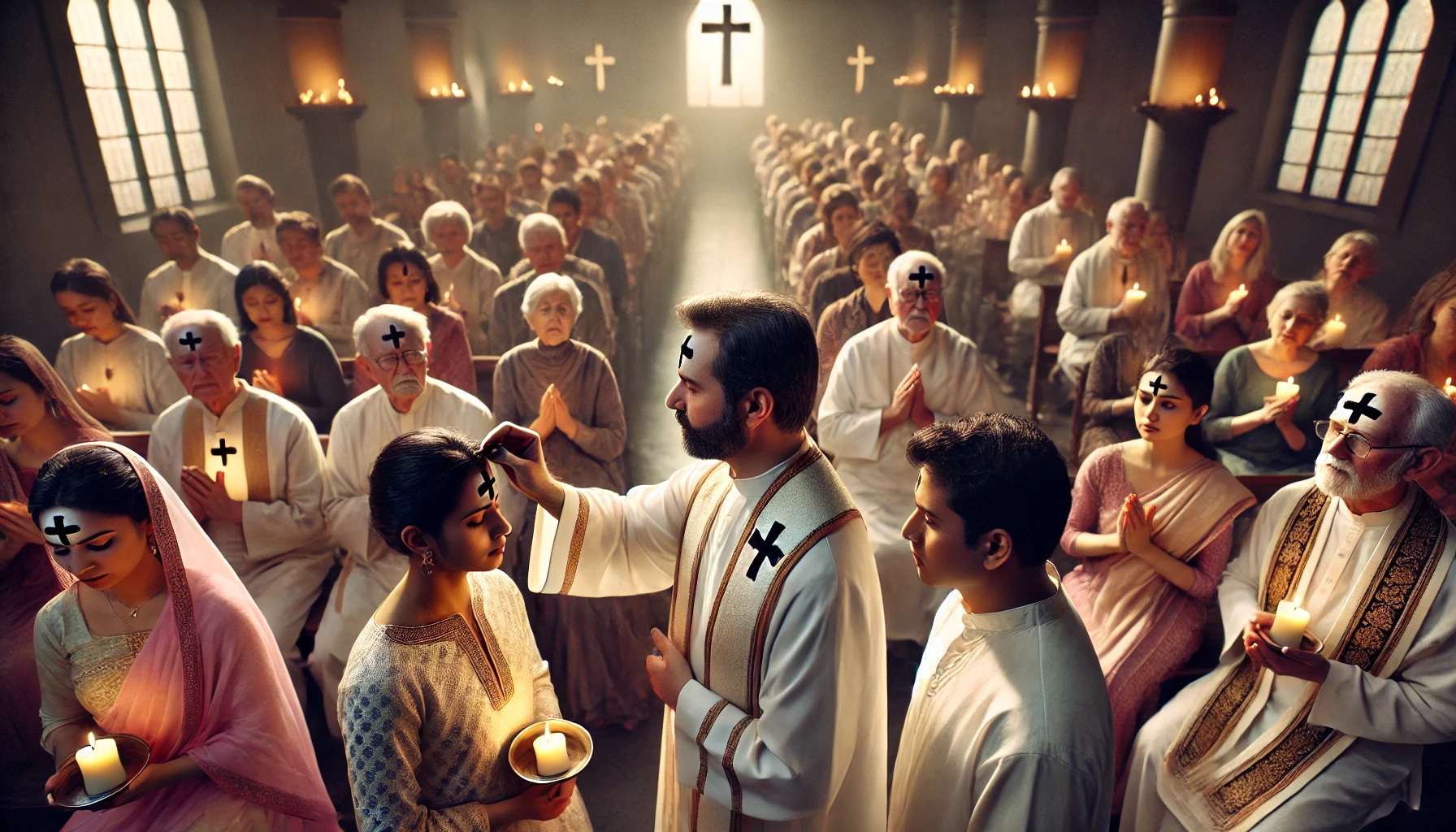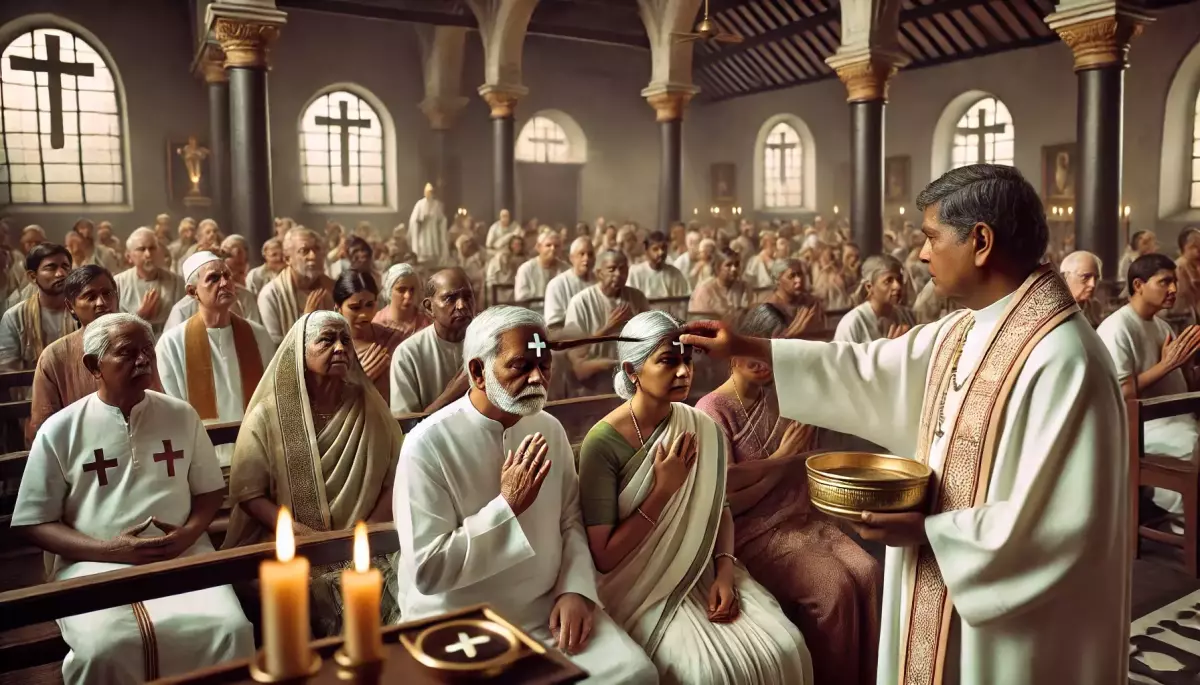Raakh Budhwaar (Ash Wednesday) marks the beginning of Lent in the Christian calendar, a significant period of reflection and penance. On this special date, the faithful gather to receive the imposition of ashes, symbolizing repentance and spiritual renewal. This traditional rite invites participants to an inner journey of self-discovery and transformation, fostering a deeper connection with their beliefs and values.
The observance of this day is an opportunity for renewal and reflection, allowing individuals to reconsider their spiritual priorities. Thus, Raakh Budhwaar is not just a ritual, but a chance to restart the relationship with faith and community. The importance of this celebration transcends traditions, inspiring the faithful to engage in practices of charity and compassion throughout Lent.
Origin of the Raakh Budhwaar holiday
Raakh Budhwaar, known as Ash Wednesday in English, is a significant day in the Christian calendar. This date marks the beginning of Lent, a 40-day period of reflection and fasting that culminates in Easter. The origin of the term "Ash Wednesday" dates back to the ritual of the imposition of ashes, which symbolizes repentance and human mortality.
Thus, the practice of applying ashes to the foreheads of the faithful has roots that trace back to the early centuries of Christianity. In Catholic, Orthodox, and Anglican churches, the ceremony is a moment of spiritual renewal and penitence.

In India, the celebration of Raakh Budhwaar is especially relevant for Christian communities, which represent a small but vibrant part of the population. Although most Indians follow religions such as Hinduism or Islam, the cultural diversity of the country allows Christian traditions, such as Raakh Budhwaar, to be celebrated with fervor. Furthermore, the date serves as a reminder of the connection between Christians in India and the global tradition, where the day is widely recognized and celebrated.
The associated rituals include participation in masses and religious services, where the imposition of ashes occurs. The faithful are invited to reflect on their lives, seek forgiveness, and prepare spiritually for Lent. The importance of the day goes beyond the religious aspect; it also fosters a sense of community among Christians, uniting them in a common goal of personal and spiritual transformation.
Full Calendar of Raakh Budhwaar (Ash Wednesday) until 2050
| Year | Next Date |
|---|---|
| Raakh Budhwaar (Ash Wednesday) in 2035 | 02/06/2035 |
| Raakh Budhwaar (Ash Wednesday) in 2032 | 02/11/2032 |
| Raakh Budhwaar (Ash Wednesday) in 2048 | 02/11/2048 |
| Raakh Budhwaar (Ash Wednesday) in 2024 | 02/14/2024 |
| Raakh Budhwaar (Ash Wednesday) in 2029 | 02/14/2029 |
| Raakh Budhwaar (Ash Wednesday) in 2040 | 02/14/2040 |
| Raakh Budhwaar (Ash Wednesday) in 2045 | 02/14/2045 |
| Raakh Budhwaar (Ash Wednesday) in 2021 | 02/17/2021 |
| Raakh Budhwaar (Ash Wednesday) in 2037 | 02/17/2037 |
| Raakh Budhwaar (Ash Wednesday) in 2026 | 02/18/2026 |
| Raakh Budhwaar (Ash Wednesday) in 2042 | 02/18/2042 |
| Raakh Budhwaar (Ash Wednesday) in 2034 | 02/21/2034 |
| Raakh Budhwaar (Ash Wednesday) in 2050 | 02/21/2050 |
| Raakh Budhwaar (Ash Wednesday) in 2023 | 02/22/2023 |
| Raakh Budhwaar (Ash Wednesday) in 2039 | 02/22/2039 |
| Raakh Budhwaar (Ash Wednesday) in 2031 | 02/25/2031 |
| Raakh Budhwaar (Ash Wednesday) in 2036 | 02/25/2036 |
| Raakh Budhwaar (Ash Wednesday) in 2047 | 02/25/2047 |
| Raakh Budhwaar (Ash Wednesday) in 2020 | 02/26/2020 |
| Raakh Budhwaar (Ash Wednesday) in 2028 | 02/29/2028 |
| Raakh Budhwaar (Ash Wednesday) in 2044 | 02/29/2044 |
| Raakh Budhwaar (Ash Wednesday) in 2022 | 03/02/2022 |
| Raakh Budhwaar (Ash Wednesday) in 2033 | 03/02/2033 |
| Raakh Budhwaar (Ash Wednesday) in 2049 | 03/02/2049 |
| Raakh Budhwaar (Ash Wednesday) in 2025 | 03/05/2025 |
| Raakh Budhwaar (Ash Wednesday) in 2041 | 03/05/2041 |
| Raakh Budhwaar (Ash Wednesday) in 2030 | 03/06/2030 |
| Raakh Budhwaar (Ash Wednesday) in 2046 | 03/06/2046 |
| Raakh Budhwaar (Ash Wednesday) in 2038 | 03/09/2038 |
| Raakh Budhwaar (Ash Wednesday) in 2027 | 03/10/2027 |
| Raakh Budhwaar (Ash Wednesday) in 2043 | 03/10/2043 |
Celebration date and its status
The Raakh Budhwaar is celebrated on Ash Wednesday, which occurs 46 days before Easter. The date is movable, varying each year depending on the lunar calendar and the date of Easter. Generally, it falls between February 4 and March 10. This means that Christians in India and around the world should pay attention to the liturgical calendar so as not to miss this important date.
Although it is not a national holiday in India, Raakh Budhwaar is widely recognized in Christian communities and celebrated in many churches. In some regions, especially where the Christian population is larger, such as Goa and Kerala, the date may be observed with local holidays or special celebrations. However, for most Indians, Ash Wednesday is an ordinary day, except for those participating in rituals and religious ceremonies.

The status of Raakh Budhwaar in India highlights the rich cultural tapestry of the country. While the celebration may be less visible compared to Hindu or Islamic festivals, it offers a glimpse into the religious diversity that characterizes India. The acceptance and respect for various religious traditions make Raakh Budhwaar an important date, even if it is not an official holiday.
Religious Importance of Raakh Budhwaar
The importance of Raakh Budhwaar transcends the religious aspect, reflecting fundamental cultural and spiritual values. For Christians, the day represents a time of repentance and reflection. The imposition of ashes is a powerful symbol that reminds the faithful of the fragility of life and the need to seek reconciliation with God. This practice is an opportunity for the faithful to commit to a more virtuous life during Lent, highlighting the relevance of spiritual discipline.

Furthermore, Raakh Budhwaar promotes unity and solidarity among Christians. The day is an occasion when communities gather in prayer and reflection, strengthening social and spiritual bonds. The sharing of experiences and the joint pursuit of a common purpose make Raakh Budhwaar a date that not only marks the beginning of Lent but also the construction of a stronger community identity.
In a broader context, the celebration of Raakh Budhwaar in India also highlights the interaction between different cultures and religions. By witnessing the traditions of Christians, other communities can learn about the universal values of compassion and forgiveness. This is particularly relevant in such a diverse country, where the peaceful coexistence of various religions is a common goal.
Curiosities or traditions associated with the holiday
One of the most striking traditions of Raakh Budhwaar is the imposition of ashes. During the masses, priests apply ashes on the foreheads of the faithful, forming a cross. This practice symbolizes repentance and human mortality, reminding participants that "from dust we came and to dust we shall return." This ceremony is a moment of introspection and spiritual renewal, and it is common for the faithful to engage in special prayers throughout the day.

Another interesting curiosity is that, in some communities, Raakh Budhwaar is preceded by a celebration known as "Carnival". This celebration occurs the day before and is marked by parties, dances, and typical foods. The idea is to say goodbye to worldly pleasures before the beginning of the period of fasting and penance. This practice is especially popular in regions like Goa, where Christian culture is vibrant and the festivities attract both locals and tourists.
Moreover, it is common for many people to choose to fast or abstain from certain foods during Lent, starting the process on Raakh Budhwaar. Traditions vary by region, but the central idea is to sacrifice something as a form of devotion. This may include avoiding meats, sweets, or other delicacies, reflecting the importance of discipline and reflection during this sacred period.
Current relevance or changes in the way of celebration over the years
Over the years, the way Raakh Budhwaar is celebrated in India has undergone some changes. Traditionally, the celebrations were more formal and centered around religious services. However, modernization and the influence of social media have brought new forms of expression and celebration. Today, many communities use online platforms to share their experiences and reflections on the day, promoting a broader connection among Christians.
Furthermore, the increasing diversity of lifestyles and urbanization have impacted how people observe Raakh Budhwaar. In urban areas, where life is busier, many Christians may not be able to attend religious services. However, this has led to the emergence of alternative celebrations, such as home gatherings, where families come together to pray and reflect. This adaptation shows how traditions can evolve without losing their essential meaning.

Finally, the relevance of Raakh Budhwaar in contemporary society is also manifested in the growing awareness of the importance of mental and spiritual health. Many churches and community groups now promote retreats and workshops during Lent, encouraging practices of meditation and mindfulness. This demonstrates a more holistic approach to spirituality, which aligns with the contemporary needs of the faithful, keeping the essence of Raakh Budhwaar alive and relevant.
- Ash Wednesday: Central ritual of Raakh Budhwaar.
- Carnival: Celebration that precedes Ash Wednesday.
- Fasting: Common practice during Lent, initiated on Raakh Budhwaar.
For more information about the celebration of Raakh Budhwaar, you can visit Catholic News or Vatican News.
Final Summary
Raakh Budhwaar is a significant milestone in the Christian calendar, marking the beginning of Lent. This celebration invites the faithful to reflect on their lives and to seek a path of repentance and spiritual renewal. Thus, it becomes a period of introspection and strengthening of faith, essential for the journey of each Christian.

Moreover, this special date promotes the unity of the community around practices of fasting and prayer. It is a moment to reassess priorities and promote positive changes. Therefore, the observance of Raakh Budhwaar is a unique opportunity for spiritual growth and the pursuit of a life more aligned with Christian principles.
Finally, the event highlights the importance of humility and penitence. It reminds us that, regardless of difficulties, there is always room for personal transformation. Thus, by celebrating this date, the faithful connect more deeply with their spirituality and with the faith community around them.
